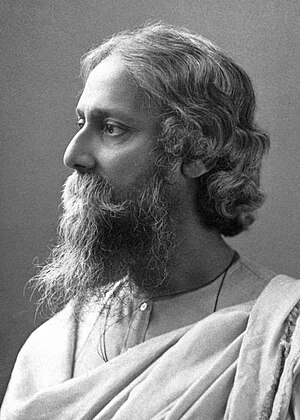Prabhat Ranjan Sarkar on Rabindranath Tagore: Difference between revisions
(Go) |
(clean up) |
||
| (15 intermediate revisions by the same user not shown) | |||
| Line 1: | Line 1: | ||
'''[[Prabhat Ranjan Sarkar]]''' was an admirer of ''' | [[File:Tagore3.jpg|thumb|Rabindranath Tagore.]] | ||
'''[[Prabhat Ranjan Sarkar]]''' was an admirer of '''Rabindranath Tagore''' and mentioned him and his literary works many times in his works and discourses. In ''Vipra Age'' (1967), Sarkar called Tagore a "genius".<ref name="EERVA1">{{cite book|title=[[The Electronic Edition of the Works of P. R. Sarkar]]|publisher=[[Ananda Marga Pracaraka Samgha]]|author=[[Prabhat Ranjan Sarkar]]|edition=7.5|chapter=Vipra Age}}</ref> | |||
== Comments on Rabindranath Tagore's life == | |||
Sarkar commented on Tagore's life many times in hos works and discourses. In ''Vipra Age'', he showed his sympathy towards Tagore who was ridiculed by his contemporary poets and writers and was not much known in his own time.<ref name="EERVA1" /> | |||
== References to Tagore's works == | |||
In the discourse ''You Have the Right to Action Only'' (9 October 1979, evening), which explaining the concept ''Karmanyevadhikaraste'', Sarkar quoted Tagore's writing— "When I sketch any object, when any object is drawn, it does not lose its mobility."<ref name="EERWKM">{{cite book|title=[[The Electronic Edition of the Works of P. R. Sarkar]]|publisher=[[Ananda Marga Pracaraka Samgha]]|author=[[Prabhat Ranjan Sarkar]]|edition=7.5|chapter='You Have the Right to Action Only'}}</ref> | |||
In another discourse, delivered at Kolkata, on 13 April 1979, Sarkar referred a poem of Tagore to illustrate how man in his finite life tries to relate him with [[Parama Purusa|the infinite]]—<ref name="EERVPVPP">{{cite book|title=[[The Electronic Edition of the Works of P. R. Sarkar]]|publisher=[[Ananda Marga Pracaraka Samgha]]|author=[[Prabhat Ranjan Sarkar]]|edition=7.5|chapter=Yatamána – the Stage of Perseverance}}</ref> | |||
{| class="wikitable" | |||
|- | |||
! [[Roman Sanskrit]] | |||
! Translation | |||
|- | |||
|<poem> | |||
Ámi ye rúper padme karechi arúp madhu pán, | |||
Duhkher bakśer májhe ánander peyechi sandhán, | |||
Ananta maoner váńii shunechi antare, | |||
Dekhechi jyotir path shunyamaya ándhár prántare. | |||
Nahi ámi vidhir brhat parihás, | |||
Asim aeshvarya niye racita mahat sarvanásh. | |||
</poem> | |||
|<poem> | |||
In the lotus of forms, I have tasted the sweetness of the Formless One, | |||
In the bosom of sorrow, I have found bliss, | |||
Inside my heart I have heard the voice of infinite silence, | |||
In the blinding darkness of the void, I have seen the path of light. | |||
I am not simply a great joke of fate, | |||
Was I created from boundless wealth, merely for annihilation? | |||
</poem> | |||
|} | |||
To explain, omnipresence of Parama Purusa, Sarkar used Tagore's illustration—<ref name="EER1000HP">{{cite book|title=[[The Electronic Edition of the Works of P. R. Sarkar]]|publisher=[[Ananda Marga Pracaraka Samgha]]|author=[[Prabhat Ranjan Sarkar]]|edition=7.5|chapter=The Thousand-Headed Puruśa}}</ref> | |||
{| class="wikitable" | |||
|- | |||
! Roman Sanskrit | |||
! Translation | |||
|- | |||
|<poem> | |||
Vishvajoŕá pháṋd petecha, kemane di-i pháṋki | |||
Ádhek dhará paŕechi go, ádhek áche báki. | |||
</poem> | |||
|<poem> | |||
You have set a world-wide trap, how can I evade it? | |||
Half of me is already trapped, half still remains | |||
</poem> | |||
|} | |||
== References == | == References == | ||
{{reflist}} | {{reflist}} | ||
Latest revision as of 01:52, 14 March 2014
Prabhat Ranjan Sarkar was an admirer of Rabindranath Tagore and mentioned him and his literary works many times in his works and discourses. In Vipra Age (1967), Sarkar called Tagore a "genius".[1]
Comments on Rabindranath Tagore's life
Sarkar commented on Tagore's life many times in hos works and discourses. In Vipra Age, he showed his sympathy towards Tagore who was ridiculed by his contemporary poets and writers and was not much known in his own time.[1]
References to Tagore's works
In the discourse You Have the Right to Action Only (9 October 1979, evening), which explaining the concept Karmanyevadhikaraste, Sarkar quoted Tagore's writing— "When I sketch any object, when any object is drawn, it does not lose its mobility."[2]
In another discourse, delivered at Kolkata, on 13 April 1979, Sarkar referred a poem of Tagore to illustrate how man in his finite life tries to relate him with the infinite—[3]
| Roman Sanskrit | Translation |
|---|---|
Ámi ye rúper padme karechi arúp madhu pán, |
In the lotus of forms, I have tasted the sweetness of the Formless One, |
To explain, omnipresence of Parama Purusa, Sarkar used Tagore's illustration—[4]
| Roman Sanskrit | Translation |
|---|---|
Vishvajoŕá pháṋd petecha, kemane di-i pháṋki |
You have set a world-wide trap, how can I evade it? |
References
- ^ a b Prabhat Ranjan Sarkar "Vipra Age" The Electronic Edition of the Works of P. R. Sarkar (7.5 ed.) Ananda Marga Pracaraka Samgha
- ^ Prabhat Ranjan Sarkar "'You Have the Right to Action Only'" The Electronic Edition of the Works of P. R. Sarkar (7.5 ed.) Ananda Marga Pracaraka Samgha
- ^ Prabhat Ranjan Sarkar "Yatamána – the Stage of Perseverance" The Electronic Edition of the Works of P. R. Sarkar (7.5 ed.) Ananda Marga Pracaraka Samgha
- ^ Prabhat Ranjan Sarkar "The Thousand-Headed Puruśa" The Electronic Edition of the Works of P. R. Sarkar (7.5 ed.) Ananda Marga Pracaraka Samgha
